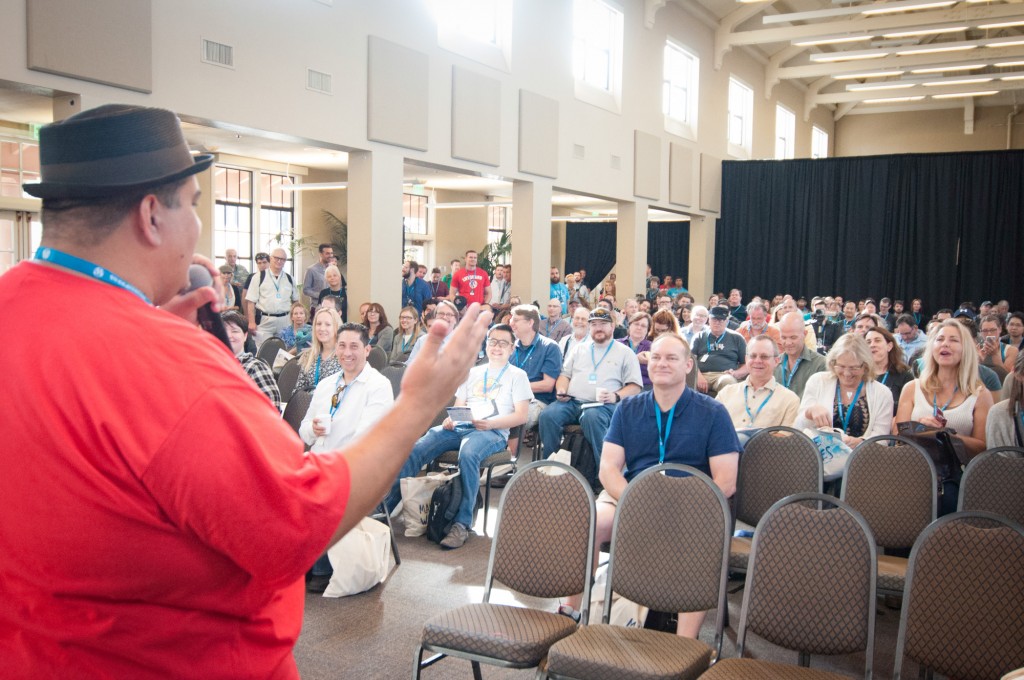People who present without notes are not magicians. They just know a few things others don't.
The perceptions behind speaking without notes
To get started, we should look at the reason why it might be worth speaking without notes. Here are three perceptions that are most important to me.
There is the perception that the speaker is knowledgable
When you have to keep looking back at notes, it can send a signal to the audience that you don't know the material, and that creates a potential credibility gap.
There is the perception that the speaker is prepared
Everyone likes a speaker that comes ready to deliver a message. When people have to keep going back to their notes, it can be perceived as less professional.
There is the perception that the speaker cares about the audience
Do you know what people like when watching a presenter? The eye contact. It creates a bond. A moment where they feel like they're connecting. And that's not always possible if the speaker is looking down at their notes.
Now, to be clear, I keep saying, “perception” because some people think about things differently, or in different contexts other perceptions may exist. But these are the three that have motivated me for a long time.
The upside of these perceptions is that the audience is more prepared to listen, engage and learn from the presentation. And isn't that what we want?
The benefit of speaking without notes
The main benefit of speaking without notes is simply this: There are no mistakes, only omissions.
Let's say I wrote out the whole script to a speech that I delivered on Saturday afternoon in St Louis. The first thing that might happen is that I might lose my place among those pages, or have to pause as I find my spot. That would be a mistake, for sure. But not as bad as if I start into a new section, then go back and look at my pages, and notice I missed something and say, “one second, let me back up…”
I know, it sounds crazy. But I've seen it a bunch.
Now, imagine the same speech, which isn't a performance. It's not a script. It's a main point with a couple of key takeaways. And if I miss a story, but still make the main point—who knows? No one but me.
Ever been to a concert? Watched a band perform a bunch of songs. Did you enjoy it? I bet you didn't have their set list. The reality is that you can totally enjoy a presentation without knowing all of what they'll perform—and if something is missed, it won't impact how you feel about the performance.
And that's what I mean by: there are no mistakes, only omissions.
So how do you speak without notes?
Speaking without notes is not as hard as you might imagine.
The exercise I share with people is to have them tell me a story, without notes, about their first date, or their favorite vacation, or how their spouse proposed. And amazingly, they're able to do it —without prep, and without notes. Amazing!
It's because they know what they're going to tell me. They know the main point. They recall the structure of the story. And they can tell it to me—beginning, middle and end.
So here are my three tips for speaking without notes.
- Try to have one main point. A single concept that you're trying to impart on your audience. Not 4, not 10, not 19. One. I know that not all talks work like that. So in the case that you can't get down to one main point, shift to three. And assign each one to a finger. (The more you practice each point, looking at one specific finger, the easier it will be to trigger your memory by popping up that finger.)
- Embed your facts in a narrative. A narrative is a story. And most of us have an easier time remembering stories than we do facts. So find the narrative that can create the structure for your presentation that makes it easier to remember. It may be how you learned the material you're going to share, or a different story that you use as an illustration. But it will shape how you share the material, how you remember it, and will make it easier (as an ancillary benefit) for your audience to remember it too!
- Practice the verbal delivery of your talk. I know a lot of people who say they're practicing and what they mean is that they're messing with their PowerPoint slides a lot. That's not practice. Actually verbalize your message and deliver it again and again. You'll be creating the memory of the words and how they went to together. I can't say it enough – early practice results in creating a memory of the talk much like the memory of your first date, a favorite vacation, or how your spouse proposed.
The more you practice, the better you'll get. It won't happen overnight. But in a few weeks or months, you'll discover the incredible freedom of not having to stare at a script. And your audience will engage in a different and better way.
You can learn to tell better stories with my online video course.

